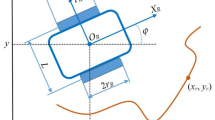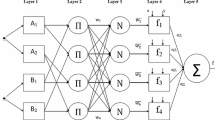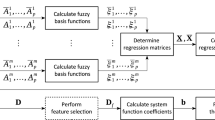Abstract
This paper proposes the use of the Differential Evolution algorithm with fuzzy logic for parameter adaptation in the optimal design of fuzzy controllers for nonlinear plants. The Differential Evolution algorithm is enhanced using Type-1 and Interval Type-2 fuzzy systems for achieving dynamic adaptation of the mutation parameter. In this paper, four control optimization problems in which the Differential Evolution algorithm optimizes the membership functions of the fuzzy controllers are presented. First, the experiments were performed with the original algorithm, second the experiments were performed with the Fuzzy Differential Evolution (in this case the mutation parameter is dynamic), and last, experiments were performed applying noise to the control plant by using Fuzzy Differential Evolution.





























Similar content being viewed by others
References
Aalto J, Lampinen J (2013) A mutation adaptation mechanism for Differential Evolution algorithm. In: 2013 IEEE congress on evolutionary computation, Cancun, Mexico, pp 55–62
Aalto J, Lampinen J (2014) A mutation and crossover adaptation mechanism for differential evolution algorithm. In: 2014 IEEE congress on evolutionary computation (CEC), Beijing, China, pp 451–458
Amador-Angulo L, Castillo O (2015) Statistical analysis of type-1 and interval type-2 fuzzy logic in dynamic parameter adaptation of the BCO. In: 2015 Conference of the International Fuzzy Systems Association and the European Society for Fuzzy Logic and Technology (IFSA-EUSFLAT-15)
Amador-Angulo L, Castillo O (2017) Comparative analysis of designing differents types of membership functions using bee colony optimization in the stabilization of fuzzy controllers. In: Melin P, Castillo O, Kacprzyk J (eds) Nature-inspired design of hybrid intelligent systems, vol 667. Springer, Cham, pp 551–571
Bi Y, Srinivasan D, Lu X, Sun Z, Zeng W (2014) Type-2 fuzzy multi-intersection traffic signal control with differential evolution optimization. Expert Syst Appl 41(16):7338–7349
Bui V-B, Tran Q-C, Bui H-L (2017) Multi-objective optimal design of fuzzy controller for structural vibration control using Hedge-algebras approach. Artif Intell Rev 50:569
Caraveo C, Valdez F, Castillo O (2016) Optimization of fuzzy controller design using a new bee colony algorithm with fuzzy dynamic parameter adaptation. Appl Soft Comput 43:131–142
Castillo O, Amador-Angulo L, Castro JR, Garcia-Valdez M (2016a) A comparative study of type-1 fuzzy logic systems, interval type-2 fuzzy logic systems and generalized type-2 fuzzy logic systems in control problems. Inf Sci 354:257–274
Castillo O, Cervantes L, Soria J, Sanchez M, Castro JR (2016b) A generalized type-2 fuzzy granular approach with applications to aerospace. Inf Sci 354:165–177
Castillo O, Ochoa P, Soria J (2016c) Differential evolution with fuzzy logic for dynamic adaptation of parameters in mathematical function optimization. In: Angelov P, Sotirov S (eds) Imprecision and uncertainty in information representation and processing, vol 332. Springer, Cham, pp 361–374
Castillo O, Melin P, Valdez F, Soria J, Ontiveros-Robles E, Peraza C, Ochoa P (2019a) Shadowed type-2 fuzzy systems for dynamic parameter adaptation in harmony search and differential evolution algorithms. Algorithms 12(1):17
Castillo O, Valdez F, Soria J, Amador-Angulo L, Ochoa P, Peraza C (2019b) Comparative study in fuzzy controller optimization using bee colony, differential evolution, and harmony search algorithms. Algorithms 12(1):9
Cervantes L, Castillo O (2015) Type-2 fuzzy logic aggregation of multiple fuzzy controllers for airplane flight control. Inf Sci 324:247–256
Cuevas E, Luque A, Zaldívar D, Pérez-Cisneros M (2017) Evolutionary calibration of fractional fuzzy controllers. Appl Intell 47:291
De La OD, Castillo O, Soria J (2017) Optimization of reactive control for mobile robots based on the CRA using type-2 fuzzy logic. In: Melin P, Castillo O, Kacprzyk J (eds) Nature-inspired design of hybrid intelligent systems, vol 667. Springer, Cham, pp 505–515
Driankov D, Palm R (2013) Advances in fuzzy control. Physica 2013:68
Dubois D, Hung TN, Henri P (2000) Possibility theory, probability and fuzzy sets misunderstandings, bridges and gaps. In: Dubois D, Prade H (eds) Fundamentals of fuzzy sets. Springer, Boston, pp 343–438
Fierro R, Castillo O (2013) Design of fuzzy control systems with different PSO variants. In: Castillo O, Melin P, Kacprzyk J (eds) Recent advances on hybrid intelligent systems, vol 451. Springer, Berlin, pp 81–88
Gao Q (2017) Universal fuzzy models and universal fuzzy controllers for stochastic non-affine nonlinear systems. In: Gao Q (ed) Universal fuzzy controllers for non-affine nonlinear systems. Springer, Singapore, pp 45–70
Juang C-F, Chen Y-H, Jhan Y-H (2015) Wall-following control of a hexapod robot using a data-driven fuzzy controller learned through differential evolution. IEEE Trans Ind Electron 62(1):611–619
Liu J, Lampinen J (2005) A fuzzy adaptive differential evolution algorithm. Soft Comput 9(6):448–462
Mamdani EH (1974) Application of fuzzy algorithms for control of simple dynamic plant. Proc Inst Electr Eng 121(12):1585
Martínez-Soto R, Castillo O, Castro JR (2014) Genetic algorithm optimization for type-2 non-singleton fuzzy logic controllers. In: Castillo O, Melin P, Pedrycz W, Kacprzyk J (eds) Recent advances on hybrid approaches for designing intelligent systems. Springer, Cham, pp 3–18
Melin P, Astudillo L, Castillo O, Valdez F, Garcia M (2013) Optimal design of type-2 and type-1 fuzzy tracking controllers for autonomous mobile robots under perturbed torques using a new chemical optimization paradigm. Expert Syst Appl 40(8):3185–3195
Mendel JM (2014) General type-2 fuzzy logic systems made simple: a tutorial. IEEE Trans Fuzzy Syst 22(5):1162–1182
Mendel JM, Liu X (2013) Simplified interval type-2 fuzzy logic systems. IEEE Trans Fuzzy Syst 21(6):1056–1069
Mohan BM, Sinha A (2008) Analytical structure and stability analysis of a fuzzy PID controller. Appl Soft Comput 8(1):749–758
Noshadi A, Shi J, Lee WS, Shi P, Kalam A (2016) Optimal PID-type fuzzy logic controller for a multi-input multi-output active magnetic bearing system. Neural Comput Appl 27(7):2031–2046
Ochoa P, Castillo O, Soria J (2016a) Fuzzy differential evolution method with dynamic parameter adaptation using type-2 fuzzy logic, pp 113–118
Ochoa P, Castillo O, Soria J (2016b) Type-2 fuzzy logic dynamic parameter adaptation in a new Fuzzy Differential Evolution method, pp 1–6
Ochoa P, Castillo O, Soria J (2017) Differential evolution using fuzzy logic and a comparative study with other metaheuristics. In: Melin P, Castillo O, Kacprzyk J (eds) Nature-inspired design of hybrid intelligent systems, vol 667. Springer, Cham, pp 257–268
Olivas F, Valdez F, Melin P, Sombra A, Castillo O (2019) Interval type-2 fuzzy logic for dynamic parameter adaptation in a modified gravitational search algorithm. Inf Sci 476:159–175
Ontiveros-Robles E, Melin P, Castillo O (2018) Comparative analysis of noise robustness of type 2 fuzzy logic controllers. Kybernetika 54(1):175–201
Peraza C, Valdez F, Melin P (2017) Optimization of intelligent controllers using a type-1 and interval type-2 fuzzy harmony search algorithm. Algorithms 10(3):82
Precup R-E, David R-C, Petriu EM, Wolf G (2017) Optimizer algorithm-based tuning of fuzzy control systems with reduced parametric sensitivity. IEEE Trans Ind Electron 64(1):527–534
Price K, Storn RM, Lampinen JA (2006) Differential evolution: a practical approach to global optimization. Springer, Berlin
Salehpour M, Jamali A, Bagheri A, Nariman-zadeh N (2017) A new adaptive differential evolution optimization algorithm based on fuzzy inference system. Eng Sci Technol Int J 20(2):587–597
Sanchez MA, Castillo O, Castro JR (2015a) Information granule formation via the concept of uncertainty-based information with interval type-2 fuzzy sets representation and Takagi–Sugeno–Kang consequents optimized with Cuckoo search. Appl Soft Comput 27:602–609
Sanchez MA, Castillo O, Castro JR (2015b) Generalized type-2 fuzzy systems for controlling a mobile robot and a performance comparison with interval type-2 and type-1 fuzzy systems. Expert Syst Appl 42(14):5904–5914
Sa-ngiamvibool W (2017) Optimal fuzzy logic proportional integral derivative controller design by Bee algorithm for hydro-thermal system. IEEE Trans Ind Inform 1:1
Sun Z, Wang N, Srinivasan D, Bi Y (2014) Optimal tuning of type-2 fuzzy logic power system stabilizer based on differential evolution algorithm. Int J Electr Power Energy Syst 62:19–28
Tang L, Zhao Y, Liu J (2014) An improved differential evolution algorithm for practical dynamic scheduling in steelmaking-continuous casting production. IEEE Trans Evol Comput 18(2):209–225
Wang Y, Liu Z-Z, Li J, Li H-X, Wang J (2018) On the selection of solutions for mutation in differential evolution. Front Comput Sci 12(2):297–315
Zadeh L (1975a) The concept of a linguistic variable and its application to approximate reasoning—I. Inf Sci 8(3):199–249
Zadeh L (1975b) The concept of a linguistic variable and its application to approximate reasoning—II. Inf Sci 8(4):301–357
Zadeh L (1978) Fuzzy sets as a basis for a theory of possibility. Fuzzy Sets Syst 1(1):3–28
Author information
Authors and Affiliations
Corresponding author
Ethics declarations
Conflict of interest
All the authors in the paper have no conflict of interest.
Ethical approval
This article does not contain any studies with human participants or animals performed by any of the authors.
Additional information
Communicated by O. Castillo, D. K. Jana.
Publisher’s Note
Springer Nature remains neutral with regard to jurisdictional claims in published maps and institutional affiliations.
Rights and permissions
About this article
Cite this article
Ochoa, P., Castillo, O. & Soria, J. Optimization of fuzzy controller design using a Differential Evolution algorithm with dynamic parameter adaptation based on Type-1 and Interval Type-2 fuzzy systems. Soft Comput 24, 193–214 (2020). https://doi.org/10.1007/s00500-019-04156-3
Published:
Issue Date:
DOI: https://doi.org/10.1007/s00500-019-04156-3




